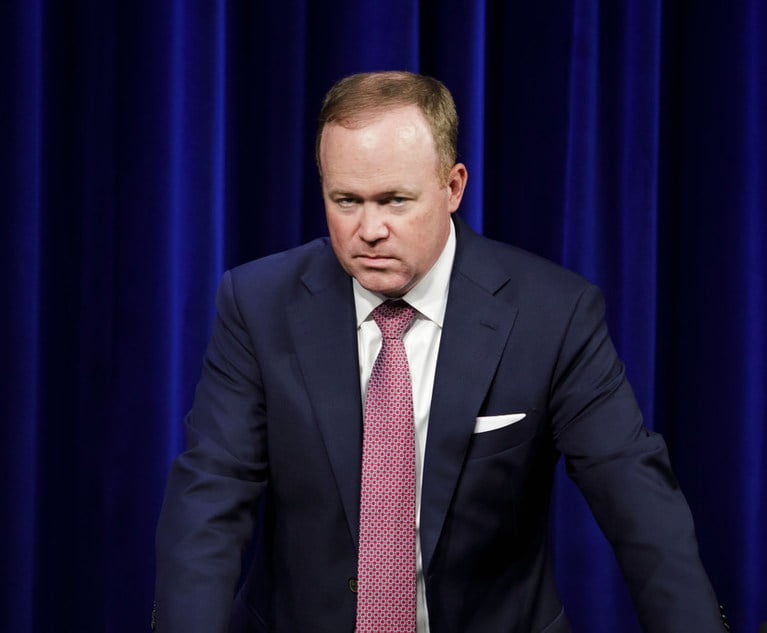 Photo: J. Albert Diaz/ALM
Photo: J. Albert Diaz/ALMCushman & Wakefield Loses $1.3M Jury-Verdict Appeal in Age Bias Case
The real estate giant denied any secret motivation to replace the 63-year-old software engineer with a younger employee.
March 11, 2019 at 03:16 PM
4 minute read
The original version of this story was published on New York Law Journal
A federal appeals court has upheld a $1.3 million jury verdict in an age-bias suit that alleged the real estate firm Cushman & Wakefield unlawfully fired a 63-year-old software engineer.
A jury awarded the former employee Yury Rinsky $425,000 in compensatory damages and $850,000 in punitive damages in a Boston federal district court. Rinsky claimed in a 2015 complaint that he was fired because of his age and disability.
The dispute focused on Rinsky's move to Massachusetts from the company's home office in New York, where he had worked for 27 years. Cushman & Wakefield disputed that he had been approved for a transfer. Rinsky declined to resign after the company said he would need to move back to New York, and he was then terminated.
Rinsky claimed his managers used his move to Massachusetts as a pretext to fire him based on his age, they replaced him with a 48-year-old engineer and they treated a younger worker's move to Florida differently. After a five-day trial, the jury sided with Rinsky on the age discrimination claim. The company then appealed the decision.
Cushman & Wakefield's lawyers at Holland & Knight and the Dallas firm Parsons McEntire McCleary argued that the New York City Human Rights Law should not have applied to Rinsky's case because he was a resident of Massachusetts. They also argued the jury instructions were unfairly biased against the company, and that there was a lack of evidence that age was a key factor in the former employee's termination.
“Contrary to Rinsky's assertions, C&W was not secretly planning to terminate him in favor of a younger employee. In fact, just the opposite was true,” Holland & Knight partner Benjamin McGovern wrote in court papers. “Rinsky was a valued employee to whom C&W had just granted a substantial raise and bonus. It was Rinsky, not C&W, who planned a clandestine move to Massachusetts and forced it upon his superiors who had no desire or motivation to replace him with a younger employee.”
Cushman & Wakefield attorneys also did no respond to request for comment.
John Dennehy of Dennehy Law and Mark Szal of Szal Law Group, in Boston, represented Rinsky, who is now 67, in the First Circuit.
“We are pleased but not surprised by the court's decision,” Szal said Monday. “It was quite clear at oral argument that the panel gave zero credence to Cushman & Wakefield's convoluted arguments, and Judge [Gary] Katzmann's thorough opinion confirmed that. This has been a long and difficult road for Mr. Rinsky and we are glad that it is reaching its end.”
Katzmann, a judge on the U.S. Court of International Trade who was sitting by designation, led the unanimous panel. The court concluded that the trial judge correctly applied the New York City Human Rights Law to Rinsky's claims.
“It would create a significant loophole in the statutory protection that the New York Court of Appeals deemed was provided to non-resident employees, if by the chicanery of misleading or lulling employees into working remotely from outside New York City before terminating them, an employer could immunize itself from liability,” Katzmann wrote.
The court also rejected Cushman & Wakefield's claims that there was not “one iota of evidence in the record to explain why C&W would have been motivated” to fire Rinsky.
“C&W has failed to meet its burden of showing either that there was no legally sufficient basis for the verdict or that the district court abused its discretion,” the appeals court concluded. The court said Rinsky “established a prima facie case of age discrimination.”
The First Circuit's decision in Rinsky v. Cushman & Wakefield:
➤➤ Get employment law news and commentary straight to your in-box with Labor of Law, a new Law.com briefing. Learn more and sign up here.
This content has been archived. It is available through our partners, LexisNexis® and Bloomberg Law.
To view this content, please continue to their sites.
Not a Lexis Subscriber?
Subscribe Now
Not a Bloomberg Law Subscriber?
Subscribe Now
NOT FOR REPRINT
© 2024 ALM Global, LLC, All Rights Reserved. Request academic re-use from www.copyright.com. All other uses, submit a request to [email protected]. For more information visit Asset & Logo Licensing.
You Might Like
View All
Insurers Dodge Sherwin-Williams' Claim for $102M Lead Paint Abatement Payment, State High Court Rules

State Appellate Court Relies on 'Cancellation Rule' for Expert's Conflicting Testimony


What Does Ohio Supreme Court's Opioid Decision Mean for Public Nuisance Claims?
6 minute readTrending Stories
Who Got The Work
Michael G. Bongiorno, Andrew Scott Dulberg and Elizabeth E. Driscoll from Wilmer Cutler Pickering Hale and Dorr have stepped in to represent Symbotic Inc., an A.I.-enabled technology platform that focuses on increasing supply chain efficiency, and other defendants in a pending shareholder derivative lawsuit. The case, filed Oct. 2 in Massachusetts District Court by the Brown Law Firm on behalf of Stephen Austen, accuses certain officers and directors of misleading investors in regard to Symbotic's potential for margin growth by failing to disclose that the company was not equipped to timely deploy its systems or manage expenses through project delays. The case, assigned to U.S. District Judge Nathaniel M. Gorton, is 1:24-cv-12522, Austen v. Cohen et al.
Who Got The Work
Edmund Polubinski and Marie Killmond of Davis Polk & Wardwell have entered appearances for data platform software development company MongoDB and other defendants in a pending shareholder derivative lawsuit. The action, filed Oct. 7 in New York Southern District Court by the Brown Law Firm, accuses the company's directors and/or officers of falsely expressing confidence in the company’s restructuring of its sales incentive plan and downplaying the severity of decreases in its upfront commitments. The case is 1:24-cv-07594, Roy v. Ittycheria et al.
Who Got The Work
Amy O. Bruchs and Kurt F. Ellison of Michael Best & Friedrich have entered appearances for Epic Systems Corp. in a pending employment discrimination lawsuit. The suit was filed Sept. 7 in Wisconsin Western District Court by Levine Eisberner LLC and Siri & Glimstad on behalf of a project manager who claims that he was wrongfully terminated after applying for a religious exemption to the defendant's COVID-19 vaccine mandate. The case, assigned to U.S. Magistrate Judge Anita Marie Boor, is 3:24-cv-00630, Secker, Nathan v. Epic Systems Corporation.
Who Got The Work
David X. Sullivan, Thomas J. Finn and Gregory A. Hall from McCarter & English have entered appearances for Sunrun Installation Services in a pending civil rights lawsuit. The complaint was filed Sept. 4 in Connecticut District Court by attorney Robert M. Berke on behalf of former employee George Edward Steins, who was arrested and charged with employing an unregistered home improvement salesperson. The complaint alleges that had Sunrun informed the Connecticut Department of Consumer Protection that the plaintiff's employment had ended in 2017 and that he no longer held Sunrun's home improvement contractor license, he would not have been hit with charges, which were dismissed in May 2024. The case, assigned to U.S. District Judge Jeffrey A. Meyer, is 3:24-cv-01423, Steins v. Sunrun, Inc. et al.
Who Got The Work
Greenberg Traurig shareholder Joshua L. Raskin has entered an appearance for boohoo.com UK Ltd. in a pending patent infringement lawsuit. The suit, filed Sept. 3 in Texas Eastern District Court by Rozier Hardt McDonough on behalf of Alto Dynamics, asserts five patents related to an online shopping platform. The case, assigned to U.S. District Judge Rodney Gilstrap, is 2:24-cv-00719, Alto Dynamics, LLC v. boohoo.com UK Limited.
Featured Firms
Law Offices of Gary Martin Hays & Associates, P.C.
(470) 294-1674
Law Offices of Mark E. Salomone
(857) 444-6468
Smith & Hassler
(713) 739-1250








